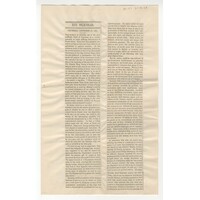Untitled
Metadata
Untitled
Publications & Reports
Bleek, while calling it the most profitable pretence, suspects that rain-making in a drought-prone country like South Africa is likely as old a practice as the pastoral or agricultural behaviour of local tribes. He recalls the only "successful" act of rainmaking by an unnamed witchdoctor (Somanxiwa ka Nomageje ka Gaqa?) in the service of the Zulu king Mpande kaSenzangakhona (Shaka and Dingane's half-brother) or Panda which seemingly caused the great Natal flood of 1856 through a cloudburst that brought unprecedented rainfall. Bleek considers this witch doctor a great scoundrel who had roasted a dog alive as a sacrifice to the Zulu gods (Mvelinqangi/Nomkhubulwane). This ostensibly cruel offering given to ostensibly cruel gods is milder than Christians who represent their God as keeping millions of his creations in eternal torment. The overwhelming outcome of the witch doctor's rainmaking reinforced belief in his practice, irrespective of whether he contacted his gods or merely had an aptitude for cloud-reading. He suggests that the government's order to pray for rain, with a day of humiliation and prayer, is another "species" of rainmaking, unwittingly comparing our deities. Bleek calls the government's 1865 proclamation ordering prayer "blasphemous" and intrusive on the religious lives of other faiths, wishing their view had instead resembled Lord Palmerston's 1853 reply. Religion is private and must exist apart from secular political life. Religious freedom (pluralism) requires mutual respect and equal adherence to the law. We do not destroy something just because we find it disagreeable. From a church-minded secularist position, Philip Crowhurst, when appearing before a magistrate for disturbing worship at St George's Church, said the civil court had no jurisdiction over spiritual matters (which Bleek discredits). Despite pursuing Crowhurst through the civil courts, various ecclesiastical bodies equally reject its authority (as happened with JJ Kotzé, TF Burgers, and J Colenso, respectively). The archaic behaviour of problematic clergy will not withstand the current truth-seeking culture of progress. He contrasts the government's poor treatment of the Renown's passengers, on account of fear, with the informed compassion of the Bonapartes who visited their cholera-stricken subjects.
Printed newsprint glued on paper
14/12/1865
Two cut out columns of newsprint text, positioned vertically parallel, pasted onto a plus-sized A4 unlined sheet with visible warping. No title was subsequently handwritten onto the mount/paper backing.
Emncourages religious introspection. Here bLeek cautions the reader to acknowledge the unastuite or unfair labeling of acts as barbaric when. Holds a mirror up to thaverage Chriostian reader and the cruelty of there own societies history and religious practices. In October 1862, a prohibition against rainmakers and healers practicing their skills was requested by the lieutenant governor and sent as a circular to all resident magistrates. The same 1862 circular also forebade healers and rainmakers' entrance into the Zulu kingdom (Flint, 2008: 108). Given the animosity between them, this great rainmaker is unlikely to be unlikely to be King Langalibalele of the amaHlubi. The idea that Somanxiwa ka Nomageje ka Gaqa may be the relevant rainmaker is loosely supported by Mongameli Mabona (2004: 243; Stuart, 1976: 72). James Stuart -- whose work relies on Mkando ka Dhlova and Gxubu ka Luduzo's (a son of one of Shepstone's messengers), among others, testimonies -- enumerates on other (alledged) rainmakers like Maqwebelende (once Shaka's captive) and Mbete of the Ngcobo people (Bryant, 1965: 274; Stuart, 1976: 158). Bleek rarely addresses Southern African traditional leaders with western-style honorofics like "His Majesty", which has only been extended to monarchs of the Zulu Kingdom throughout his Het Volksblad discourses. This exception could be Colenso's influence in the 1850s.


Contributions